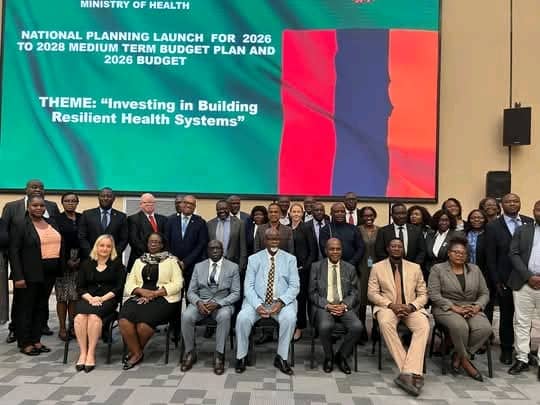Government Launches 2026–2028 Plan To Build Resilient Health Systems

The Ministry of Health has launched an ambitious roadmap to overhaul and strengthen Zambia’s health sector, unveiling the 2026–2028 Medium-Term Budget Plan (MTBP) and the 2026 national health budget under the theme “Investing in Building Health Resilient Systems.” The launch, led by Health Minister Dr. Elijah Muchima, signals a strategic shift towards a more adaptive and inclusive healthcare infrastructure aimed at long-term sustainability.
Speaking at the event, Dr. Muchima emphasized the need for a people-centered approach to service delivery, urging Provincial Health Directors to focus planning around community needs. “We carry a huge responsibility as a Ministry, and it is only through concerted effort and teamwork that we can significantly improve the health status of our nation,” he stated. The Minister also called for increased investment in local scientific research to develop indigenous medicines that can benefit the wider population.
The plan has drawn strong support from health partners, with United Nations Population Fund (UNFPA) Deputy Representative Ms. Anna Holmstrom praising the government’s vision. “The theme captures a direction we must all commit to. Building a stronger, more adaptive and inclusive system will ensure Zambia is not only able to respond to shocks but also deliver sustained, equitable and high-quality health services for all,” she said. Holmstrom commended the Ministry for anchoring its strategy on reliable Health Management Information Systems (HMIS), which she described as essential for evidence-based planning.
Churches Health Association of Zambia (CHAZ), a key local partner in healthcare delivery, also pledged continued support. CHAZ Director for Grants, Compliance Risk and Procurement Mr. Michael Kachumi expressed concern over dwindling donor funding, warning that it could negatively impact service delivery. “We hope these deliberations will shape a resilient future for our health sector, especially as we face reduced external support and other economic challenges,” he said.
Mr. Kachumi called on the government to diversify its revenue streams to secure the health sector, emphasizing the need to strengthen national health insurance mechanisms like NHIMA. He proposed innovative solutions for rural communities, including a barter system where patients can access healthcare in exchange for farm produce. “This will help marginalized groups access critical services even in the absence of cash,” he noted.
The launch marks a pivotal moment in Zambia’s health planning efforts, demonstrating a commitment not only to meet immediate healthcare needs but to build systems that are durable, inclusive, and future-ready. As stakeholders rally behind the Ministry’s plan, it is evident that collaboration across government, civil society, and international partners will be vital in transforming Zambia’s health landscape.
